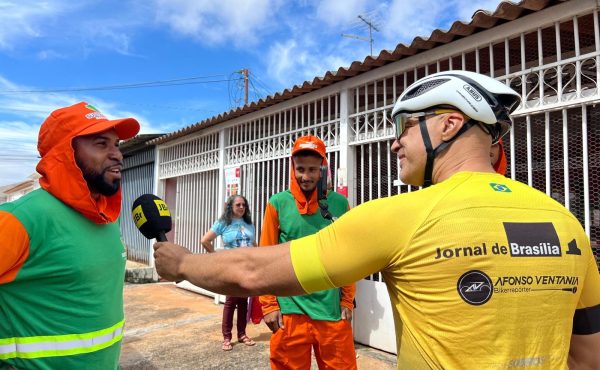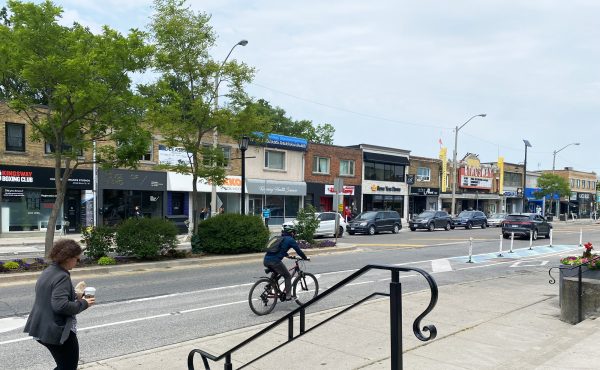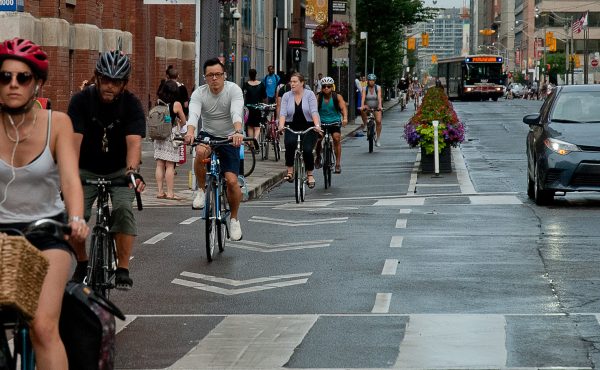
A few days ago, someone called Chad Nuttall emailed me with a good idea (I assume he contacted me because of my post about Igor Kenk’s stolen bikes). The police have recovered upwards of 2,700 bikes from Igor’s various storage spaces, and only a few hundred have been claimed. Instead of simply auctioning the remaining bikes off (standard police procedure), he thought, why not distribute them to people in need, who could really use a bike but might not be able to afford them?
I thought this was a great idea. It’s a city goal to get more people cycling, especially outside the central city. It would be a great idea to give bikes to youth in the various “priority neighbourhoods”, which would both get them into cycling, and provide them with independent mobility they may well lack at the moment. While a lot of Igor’s bikes probably need a lot of work, I’m sure it would be possible to get volunteers to show youth how to fix the bikes up, thus also providing useful skills.
I suggested he contact the Toronto Cyclists Union. It turned out they had received similar suggestions from others, and were already working on the idea. Unfortunately, when their coordinator, Rick Conroy, contacted Toronto Police Services, he got the following response:
Rick
We have also received messages like the one below. Unfortunately our legal advice says the Police Services Act precludes us from doing that.
Mark Pugash
Director of Public Information, Toronto Police Service
I can imagine, as my colleague Matt Blackett hypothesized, that there is something in the Police Services Act to prevent police giving away stolen goods for fear of potential favouritism. But I’m sure that there must be ways around this, too — for example, giving the bikes to a registered charity. “Legal paralysis” — where no-one wants to do anything original for fear of possible legal repercussions — is a 21st century condition, but we need to keep it in perspective. Often solutions can be found if there is a real will to do so. It would be great if this moment of sudden bike-awareness in Toronto, and the tragedy of possibly thousands of stolen bikes, could be turned into a happy ending of bikes for youth who need them, creating new cyclists across the city.
photo by Camille King




15 comments
Perhaps the city could buy them in bulk (at a good discount I hope) and then distribute them, or even setup some sort of bike sharing program.
Is it possible to donate money to a specific charity just so that they can purchase a large number of the bikes and then subsequently give them to disadvantaged youth? Maybe that’s too complicated… I do like the idea of donating the bikes though. In defense of the police, it’s probably a lot more work to figure out who to give the bikes to and I can see how various procedures wouldn’t allow them to do that for all sorts of legal reasons.
Toronto could give bikes to those who need them _and_ beef up its bike share program so it’s the best in the world. Is it legal to sell bikes at auction but not to give them away or is it just more lucrative?
Didn’t take long to look up. The Police Services Act is absurdly specific. Section 132(4), which even mentions bikes, requires that they must be sold at a public auction.
So the police can’t directly donate the bikes to a charity. However, here’s a possibility: perhaps they could convince a charity to buy the bikes at auction, and then donate the proceeds of the auction back to the charity under section 132(2).
That’s great! Thanks Dylan. You are bang on the with the “Legal paralysis.”
C
What if local businesses bought bikes and donated them in return for having their name on them? And bike stores donated the time to fix them up in return for the same deal?
In a quick piece on this thievery submitted to Matt at his request awhile back I raised the flag that the proceeds from the sale of bikes may well be going to a police-controlled “charity” fund, though my memory is hazy. I do remember Councillor Moscoe trying to redirect these funds a few years ago to a more clearly charitable usage but I don’t think he succeeded. Rather than having the windfall from these bikes found more through a fluke than the police doing their jobs for the last maybe decade, we should take the bucks and start a fund to help with the funeral expenses of those cyclists whose lives are stolen from them and their circles. Presumably there’s going to be a few thousands available to start off a reserve/trust fund, and odds are more people might start paying more at the police auctions if they knew it was for a good cause.
Having bought bikes through the Police ebay auction process it really is not suited to dealing with this number of bikes. Buying something on ebay requires a lot of extra effort compared to just buying something in person. The bikes would probably have to be sold in lots because of the large numbers. Overall, this means used bike wholesalers would likely benefit and you’d have the stolen bikes sold back to the community at a profit.
The auction facility in south Etobicoke is absurdly inconvenient at one corner of the city and could not handle this volume. Maybe a giant old-fashioned auction in a city park might be possible?
“Maybe a giant old-fashioned auction in a city park”
Or the Ex?
the city could startup a bike rental service
Yeah, restart Bike Share!
It sounds like we need a petition to be organized to show that the cyclist community wants too see a different procedure for these very remarkable circumstances. If the only legal way of dealing with the property is to auction it, then perhaps the police need to show a sign of good faith and give first access to charities/community groups like CBN, Bike Pirates, Bike Chain, Bicycles for Humanity, etc. who should be able to take away a lot of the bikes at a low cost, in the hopes of fixing them up and putting them back onto the streets. The people who access these groups are often people who have their bikes stolen and can’t afford a new one. It would be good karma all around.
Let’s melt them all down and make a giant Igor statue which can be erected in Trinity Bellwoods Park. That man is a living legend.
Read the regs.
“1. The property was stolen from its owner or was found abandoned in a public place, and the chief of police is unable to determine who owns it.
2. The property was seized by a member of the police force in the lawful execution of his or her duties, all legal proceedings in respect of the property have been completed, there is no court order for its disposition and there is no legal requirement, apart from this section, that it be retained or disposed of.”
a) none of mr. kenk’s bikes have been proven stolen
b) Kenk has not even started the legal proceedings to recover the unclaimed ones.
why in god’s name is any sane person wasting their time talking about donating them to anyone?
@Wallace @Lou
While I refuse to comment on my sanity. 😉 I think it’s important to try to influence what happens with the bikes while the story is still such a hot topic in the media. At least get the idea into the public realm.
So we have moved on to the petition. Please drop by and sign. Thanks!
http://chadnuttall.com/2008/08/petition-stolen-bikes-to-those-in-need.html
C